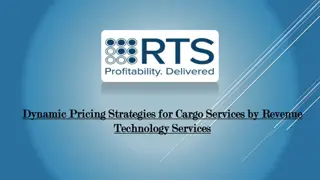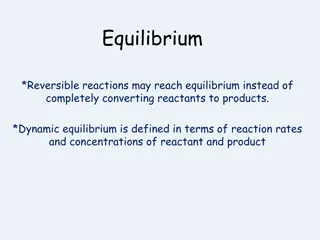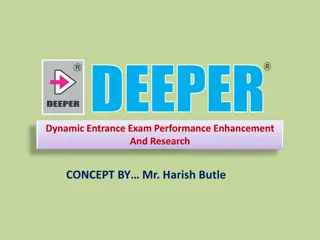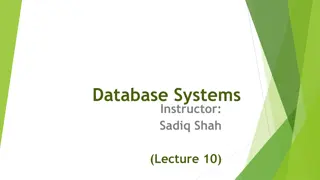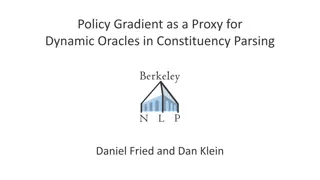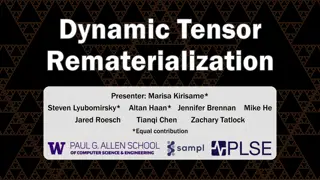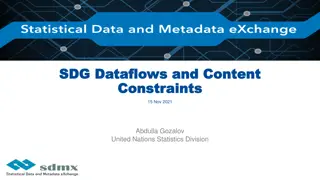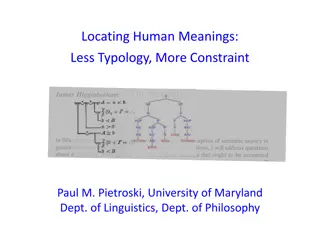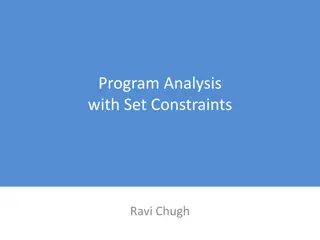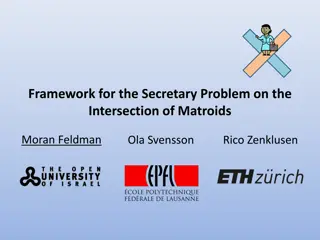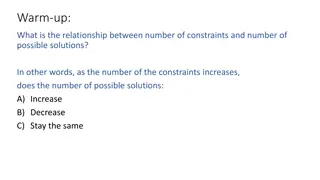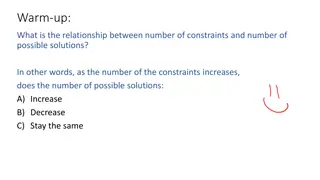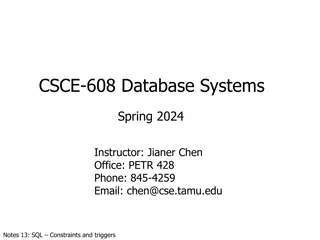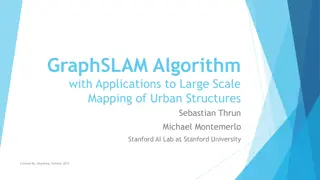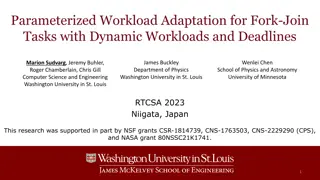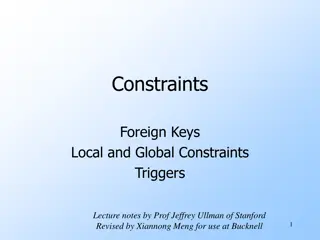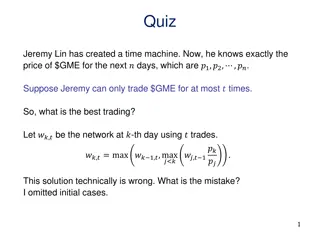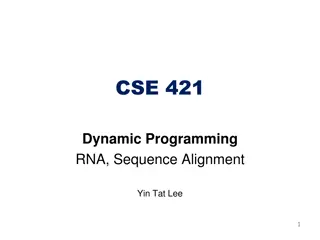Read⚡ebook✔[PDF] Life in the Universe: Expectations and Constraints (Springer P
\"COPY LINK HERE ; https:\/\/getpdf.readbooks.link\/3319976575\n\nREAD [PDF] Life in the Universe: Expectations and Constraints (Springer Praxis Books) | Life in the Universe: Expectations and Constraints (Springer Praxis Books)\n\"\n
1 views • 6 slides
Introduction to Optimization in Process Engineering
Optimization in process engineering involves obtaining the best possible solution for a given process by minimizing or maximizing a specific performance criterion while considering various constraints. This process is crucial for achieving improved yields, reducing pollutants, energy consumption, an
10 views • 52 slides
Dynamic Pricing Strategies for Cargo Services by Revenue Technology Services
In today's fast-paced and competitive logistics industry, dynamic pricing has emerged as a pivotal strategy for maximizing revenue and improving efficiency. Revenue Technology Services (RTS), a leading provider of advanced cargo solutions, leverages dynamic pricing to optimize cargo service offering
1 views • 6 slides
Being a Dynamic Social Citizen: Start with Hello Week 2019-2020
Why is being a dynamic citizen important? Learn how connectedness can positively impact behavior and success in school. Explore key definitions like "Connectedness," "Dynamic," "Social Citizen," and "Inclusive," and discover a three-step guide on becoming a dynamic citizen by recognizing when peers
1 views • 17 slides
Dynamic Memory Allocation in Computer Systems: An Overview
Dynamic memory allocation in computer systems involves the acquisition of virtual memory at runtime for data structures whose size is only known at runtime. This process is managed by dynamic memory allocators, such as malloc, to handle memory invisible to user code, application kernels, and virtual
0 views • 70 slides
Enhancing European Aviation with Dynamic RAD Airline Briefing
Starting from 4th Nov 2022, ENAIRE is trialling Dynamic RAD to provide DCT options within their airspace, optimizing airspace usage and reducing distances for airlines. Objectives include allowing ANSPs to test new restrictions, supporting procedure fine-tuning, and facilitating local assessments. T
0 views • 12 slides
Understanding Dynamic Equilibrium in Chemical Reactions
Explanation of reversible reactions, dynamic equilibrium, and the characteristics of equilibrium in chemical systems. Covers the concept of reversible reactions, dynamic equilibrium, rules for dynamic equilibrium, and examples to illustrate these concepts visually.
0 views • 54 slides
Dynamic Entrance Exam Performance Enhancement And Research Concept
Mr. Harish Butle introduces a concept to enhance entrance exam performance with dynamic methods. DEEPER, a self-reliant NGO, conducts mock tests for national and state entrance exams, aiding students in achieving academic success. The organization's objectives include providing quality education reg
0 views • 21 slides
Understanding Integrity Constraints in Relational Database Systems
Integrity constraints play a crucial role in maintaining the accuracy and integrity of data in a database. They include domain constraints, entity integrity, and referential integrity, each serving a specific purpose to ensure data consistency and reliability. Domain constraints ensure values in a c
0 views • 12 slides
Maximizing Profits in Production Scenarios
Explore two production scenarios to maximize profits using optimization models. The first scenario involves a cookie store with constraints on cookie production and labor hours. The second scenario features a computer factory maximizing profit considering production line and labor constraints. Learn
0 views • 14 slides
Eugene A. Nida - Pioneer of Dynamic Equivalence Bible Translation Theory
Eugene A. Nida (1914-2011) was a linguist who revolutionized Bible translation theory with his concept of dynamic equivalence. Through works like "Toward a Science of Translating," he shaped modern translation studies. Nida's theory distinguishes between formal and dynamic equivalence, favoring the
0 views • 10 slides
Understanding High Dynamic Range Sensors in Computational Photography
Dive into the world of High Dynamic Range (HDR) sensors in computational photography with topics covering sensor architectures, CMOS sensing techniques, dynamic range evaluation, and basic concepts related to image sensors and pixel integrators. Explore the importance of dynamic range in capturing a
6 views • 33 slides
Integrated Reservoir Characterization in Semliki Basin, Albertine Graben
Quantitative reservoir characterization using rock physics, seismic, and geological constraints is crucial for hydrocarbon prospect evaluation. This study by Nakajigo Joan explores the integration of these disciplines in the Semliki Basin to improve reservoir property delineation and reduce uncertai
0 views • 24 slides
Econometric Theory for Games: Complete Information, Equilibria, and Set Inference
This tutorial series discusses econometric theory for games, covering estimation in static games, Markovian dynamic games, complete information games, auction games, algorithmic game theory, and mechanism design. It explores topics like multiplicity of equilibria, set inference, and mechanism design
1 views • 23 slides
Dynamic Oracle Training in Constituency Parsing
Policy gradient serves as a proxy for dynamic oracles in constituency parsing, helping to improve parsing accuracy by supervising each state with an expert policy. When dynamic oracles are not available, reinforcement learning can be used as an alternative to achieve better results in various natura
0 views • 20 slides
Managing Data Integrity with Constraints
Constraints play a crucial role in maintaining the integrity of your database by limiting and restricting the type of data that can be stored. They prevent bad data from entering the database, ensuring data quality and consistency. Neglecting constraints can lead to serious data issues and even cata
0 views • 35 slides
Overcoming Memory Constraints in Deep Neural Network Design
Limited availability of high bandwidth on-device memory presents a challenge in exploring new architectures for deep neural networks. Memory constraints have been identified as a bottleneck in state-of-the-art models. Various strategies such as Tensor Rematerialization, Bottleneck Activations, and G
0 views • 32 slides
Understanding SDMX Dataflows and Content Constraints
Explore the structure and significance of SDMX dataflows and content constraints in managing and reporting data effectively. Learn about global dataflows, content constraints, and types of constraints to ensure accurate and compliant reporting of datasets.
1 views • 11 slides
Understanding Sketching and Constraints in SolidWorks
Explore the process of sketching in SolidWorks, from defining dimensions and geometric constraints to understanding sketch states. Learn how to manage underdefined, fully defined, and overdefined sketches, along with tips for adding, editing, and deleting constraints effectively.
0 views • 16 slides
Dynamic Memory Management Overview
Understanding dynamic memory management is crucial in programming to efficiently allocate and deallocate memory during runtime. The memory is divided into the stack and the heap, each serving specific purposes in storing local and dynamic data. Dynamic memory allocators organize the heap for efficie
0 views • 31 slides
Exploring Human Meaning Types and Linguistic Constraints
Delve into the exploration of human meaning types through linguistic expressions, constraints, and interpretations. Analyze diverse expressions that connect meanings with pronunciations based on certain constraints, highlighting the complexity and nuances of language acquisition and comprehension.
0 views • 57 slides
Understanding Program Analysis with Set Constraints
Explore the concept of program analysis with set constraints, delving into techniques like set-variable-based analysis, constant propagation, and constraint graphs. Learn about term constraints, additional implicit constraints, and function calls in the context of set-constraint based analysis. Gain
0 views • 49 slides
Understanding Dynamic Programming for Knapsack Problem and Solutions
Dynamic Programming is a powerful technique used to optimize solutions in the Knapsack Problem by selecting items with maximum value within certain constraints. This approach involves creating a table, making optimal choices, and outputting the best solution. The process is exemplified through a ste
0 views • 11 slides
Matroid Secretary Problem: Intersection of Matroids & Variants
Variants of the Secretary Problem with matroid constraints have been explored, allowing for hiring multiple secretaries based on certain constraints to maximize total value. The Matroid Secretary Problem, a crucial variant, presents challenges and opportunities for algorithmic solutions in various a
0 views • 16 slides
Understanding Economic Choices: Consumption, Budget Constraints, and Preferences
Explore the concept of scarcity in economics and how individuals make trade-offs in choosing what to consume, work hours, and intertemporal decisions. Learn about budget constraints, the impact of income and prices, and how personal preferences shape decision-making along labor-leisure constraints t
0 views • 21 slides
Relationship Between Constraints and Possible Solutions in CSPs
The relationship between the number of constraints and possible solutions in Constraint Satisfaction Problems (CSPs) is crucial. As the number of constraints increases, the number of possible solutions typically decreases. This phenomenon highlights the impact of constraints on the feasible solution
0 views • 43 slides
Logical Agents and Constraints in AI
Logical agents in AI rely on constraints to deduce solutions. As the number of constraints increases, the number of possible solutions can either decrease, stay the same, or increase. This relationship is crucial for problem-solving and reasoning in AI systems.
0 views • 66 slides
Constraints on Top EW Couplings: Workshop on Top Physics at the LC
Workshop on Top Physics at the LC in Paris discussed present and future constraints on top electroweak couplings. The talk indicated how constraints from previous measurements at LEP, Tevatron, and SLC impact realistic expectations. Composite models like Little Higgs play a significant role in top q
0 views • 20 slides
Understanding SQL Constraints and Triggers in Database Systems
SQL (Structured Query Language) provides a high-level approach to database management by focusing on what needs to be done rather than how. Constraints and triggers play vital roles in ensuring data integrity and enforcing specific actions. Keys, foreign keys, value-based constraints, tuple-based co
0 views • 130 slides
Challenges and Innovations in CXL 3.0 Dynamic Capacity Devices
Exploring the intricacies of CXL 3.0 Dynamic Capacity Devices presented at the LPC CXL micro conference 2023, focusing on asynchronous memory operations, partial extents, interleaving flow challenges, and memory sharing. The discussion delves into the dynamic capacity feature allowing memory changes
0 views • 17 slides
Understanding GraphSLAM: Mapping Urban Structures with Soft Constraints
GraphSLAM is an algorithm that extracts soft constraints from data in the form of a sparse graph to create a globally consistent map and robot path. The key idea involves resolving these constraints for accurate mapping. The exposition details assumptions, measurements, and robot poses in the GraphS
0 views • 19 slides
Discover the Benefits of Dynamic Yoga Practice
Dynamic Yoga is an ancient practice focusing on fluid and lively movements, offering immense health benefits such as toning internal organs, strengthening connective tissue, correcting spine alignment, enhancing breathing technique, and promoting mental clarity. Explore dynamic yoga poses like Chair
0 views • 5 slides
Advanced Techniques in Shape and Illumination Analysis
Exploring cutting-edge methods such as shape recovery from varying illumination and viewpoint, dynamic shape refinement from multi-view video, and depth estimation through photometric stereo constraints. The process involves factorization, compute depth maps, normal field calculations, and final sur
0 views • 13 slides
Parameterized Workload Adaptation for Fork-Join Tasks with Dynamic Workloads and Deadlines
In dynamic environments, tasks may face unknown workloads and deadlines, leading to system overload and missed deadlines. This research focuses on adapting task workloads to provide results before the deadline by adjusting computational parameters. It explores how to minimize degradation of result u
0 views • 31 slides
Real-time Monitoring in Dynamic Sensor Networks: LiMoSense Study
This study delves into LiMoSense, a live monitoring approach for dynamic sensor networks, exploring challenges such as correctness, convergence, and dynamic behavior. The research focuses on sensors' communication, aggregation of read values, and the use of bidirectional and unidirectional communica
0 views • 45 slides
Understanding Database Constraints, Keys, and Triggers
Explore the concepts of constraints, foreign keys, local and global constraints, and triggers in the context of database management systems. Delve into topics such as types of constraints, keys, and expressing foreign keys with examples. Enhance your understanding of database integrity and data rela
0 views • 40 slides
Optimizing Linear Programming Using Slack Variables
In linear programming, replacing inequality constraints with equalities using slack variables can help in finding optimal solutions efficiently. This process involves identifying basic and non-basic variables, applying pivot rules to improve the objective function, and rewriting constraints based on
0 views • 12 slides
Understanding Dynamic Loading and Linking in Memory Management
This presentation covers the concepts of dynamic loading and linking in memory management, discussing how programs and data are managed in physical memory, the advantages of dynamic loading, and the process of dynamic linking for system language libraries. The use of stubs for locating memory-reside
0 views • 12 slides
Dynamic Programming in Various Algorithms
Jeremy Lin has invented a time machine that predicts $GME stock prices for upcoming days. The challenge is to determine the best trading strategy given the price predictions and constraints on the number of trades allowed. Alongside, there are announcements related to academic activities like homewo
0 views • 36 slides
Understanding RNA Secondary Structure Through Dynamic Programming
Exploring the concept of RNA secondary structure using dynamic programming, focusing on base pair formations and the rules governing them. The content discusses Watson-Crick pairing, non-crossing constraints, and the importance of maximizing free energy in RNA molecules. It also delves into recursiv
0 views • 29 slides
![Read⚡ebook✔[PDF] Life in the Universe: Expectations and Constraints (Springer P](/thumb/21626/read-ebook-pdf-life-in-the-universe-expectations-and-constraints-springer-p.jpg)

